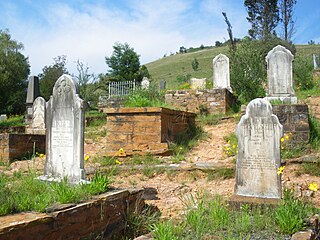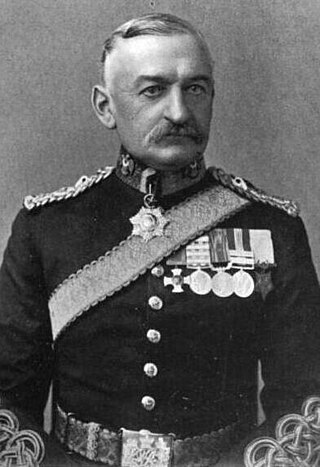
The South African Republic, also known as the Transvaal Republic, was an independent Boer republic in Southern Africa which existed from 1852 to 1902, when it was annexed into the British Empire as a result of the Second Boer War.

The Second Boer War, also known as the Boer War, the Anglo–Boer War, or the South African War, was a conflict fought between the British Empire and the two Boer Republics over the Empire's influence in Southern Africa from 1899 to 1902.

The Jameson Raid was a botched raid against the South African Republic carried out by British colonial administrator Leander Starr Jameson, under the employment of Cecil Rhodes. It involved 500 British South Africa Company police launched from Rhodesia over the New Year weekend of 1895–96. Paul Kruger, for whom Rhodes had great personal hatred, was president of the South African Republic at the time. The raid was intended to trigger an uprising by the primarily British expatriate workers in the Transvaal but it failed. The workers were referred to as The Johannesburg Conspirators. They were expected to recruit an army and prepare for an insurrection; however, the raid was ineffective, and no uprising took place. The results included embarrassment of the British government; the replacement of Cecil Rhodes as prime minister of the Cape Colony; and the strengthening of Boer dominance of the Transvaal and its gold mines. The raid was a contributory cause of the Anglo-Boer War (1899–1902).

Stephanus Johannes Paulus Kruger was a South African politician. He was one of the dominant political and military figures in 19th-century South Africa, and State President of the South African Republic from 1883 to 1900. Nicknamed Oom Paul, he came to international prominence as the face of the Boer cause—that of the Transvaal and its neighbour the Orange Free State—against Britain during the Second Boer War of 1899–1902. He has been called a personification of Afrikanerdom, and remains a controversial figure; admirers venerate him as a tragic folk hero.

The First Boer War, was fought from 16 December 1880 until 23 March 1881 between the United Kingdom and Boers of the Transvaal. The war resulted in a Boer victory and eventual independence of the South African Republic. The war is also known as the First Anglo–Boer War, the Transvaal War or the Transvaal Rebellion.

Sir Leander Starr Jameson, 1st Baronet,, was a British colonial politician, who was best known for his involvement in the ill-fated Jameson Raid.

Uitlander, Afrikaans for "foreigner", was a foreign migrant worker during the Witwatersrand Gold Rush in the independent Transvaal Republic following the discovery of gold in 1886. The limited rights granted to this group in the independent Boer Republics was one of the contributing factors behind the Second Boer War.

The Witwatersrand Gold Rush was a gold rush that began in 1886 and led to the establishment of Johannesburg, South Africa. It was a part of the Mineral Revolution.

John Hays Hammond was an American mining engineer, diplomat, and philanthropist. He amassed a sizable fortune before the age of 40. An early advocate of deep mining, Hammond was given complete charge of Cecil Rhodes' mines in South Africa and made each undertaking a financial success. He was a main force planning and executing the Jameson Raid in 1895. It was a fiasco and Hammond, along with the other leaders of the Johannesburg Reform Committee, was arrested and sentenced to death. The Reform Committee leaders were released after paying large fines, but like many of the leaders, Hammond escaped Africa for good. He returned to the United States, became a close friend of President William Howard Taft, and was appointed a special ambassador. At the same time, he continued to develop mines in Mexico and California and, in 1923, he made another fortune while drilling for oil with the Burnham Exploration Company.

Field Marshal Jan Christian Smuts, OM, CH, ED, KC, FRS was a prominent South African and Commonwealth statesman, military leader, and philosopher. He served as a Boer General during the Boer War, a British General during the First World War and was appointed Field Marshal by King George VI during the Second World War. In addition to various cabinet appointments, he served as Prime Minister of the Union of South Africa from 1919 until 1924 and from 1939 until 1948. From 1917 to 1919 he was one of five members of the British War Cabinet, helping to create the Royal Air Force. He played a leading part in the post-war settlements at the end of both world wars, making significant contributions towards the creation of the League of Nations and the United Nations. He did much to redefine the relationship between Britain and the Dominions and Colonies, leading to the formation of the British Commonwealth.

Sir James Percy FitzPatrick,, known as Percy FitzPatrick, was a South African author, politician, mining financier and pioneer of the fruit industry. He authored the classic children's book, Jock of the Bushveld (1907). As a politician, he defended British Imperial interests before and during the Anglo-Boer War. FitzPatrick is responsible for the creation of the two-minute silence observed on Armistice Day.

Colonel Francis William Rhodes is perhaps the best known member of the Rhodes family after his brother Cecil. Trained as a soldier from his youth, he participated in a considerable amount of conflict in different parts of the world. After graduating from the Royal Military College, Sandhurst, he joined the 1st Royal Dragoons in 1873 and served the British Army for 23 years. He participated in the Sudan Campaign, accompanied the Nile Expedition to Khartoum in the abortive effort to relieve General Charles George Gordon, and was present at the battles of El Teb and Tamai. At the Battle of Abu Klea, he distinguished himself when he had several horses shot from under him in the course of the engagement. He was awarded several medals and clasps, including the Distinguished Service Order.

Sir Lionel Phillips, 1st Baronet was a British-born South African financier, mining magnate and politician.

Colonel John Dale Lace was a South African gold and diamond mining magnate and Randlord. He was born in Port St Mary on the Isle of Man.

The South African Wars, including – and commonly referred to as – the Confederation Wars, were a series of wars that occurred in the southern portion of the African continent between 1879 and 1915. Ethnic, political, and social tensions between European colonial powers and indigenous Africans led to increasing hostilities, culminating in a series of wars and revolts, which had lasting repercussions on the entire region. A key factor behind the growth of these tensions was the pursuit of commerce and resources, both by countries and individuals, especially following the discoveries of diamonds in the region in 1867 and gold in 1862.
The Drifts Crisis of 1895 was an imperial-republican confrontation in South Africa that took place in September and October 1895. It was precipitated by the closing of fords, which in South Africa were known as ‘drifts’. The Crisis has traditionally been seen as the precursor to the Jameson Raid and the uncompromising policies of High Commissioner for Southern Africa Alfred Milner which followed, and eventually led to the Second Anglo-Boer War. Historians generally regard the conflicts to have been between the Cape Colony and the South African Republic (SAR), informally known as the Transvaal Republic.
Sir Johannes (John) Wilhelmus Wessels (1862–1936) was an Afrikaner judge of the Appellate Division from 1923 to 1936 and Chief Justice of South Africa from 1932 to 1936.

In the Colonies and Boer Republics which became the Union of South Africa in 1910, several unofficial military decorations and medals were instituted and awarded during the nineteenth and early twentieth century. The Johannesburg Vrijwilliger Corps Medal is an unofficial private campaign medal which was instituted in 1899 by Lieutenant Colonel S.H. van Diggelen, the founder and Commanding Officer of the Johannesburg Vrijwilliger Corps, for award to the officers and men of his unit.

Sir John Christopher Willoughby, 5th Baronet DSO was a British army officer, Justice of the Peace for Oxfordshire, and landowner of properties in Oxfordshire and Buckinghamshire.
Jan Eloff was the first civilian commissioner and the second mining commissioner in Johannesburg and the man to whom Eloff Street was named after, the first street to be surveyed. In time, twelve streets in the Greater Johannesburg area were named after him.

















